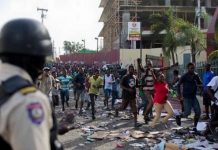Last week, Haitian demonstrators erected barricades of burning tires and car frames in front of former President Jean-Bertrand Aristide’s home in Tabarre to prevent the government of President Michel Martelly from arresting him. On Aug. 12, investigating judge Lamarre Bélizaire had issued a court summons for Aristide to come to his offices for
questioning the next day, Aug. 13. Aristide never received the
last-minute summons which was allegedly left at his gate, according to his lawyer Mario Joseph. Having heard about the summons on the radio, Joseph did show up at the 10 a.m. hearing with a letter explaining that the summons had not been correctly served. Ironically, Judge Bélizaire did not show up for his own hearing but nonetheless later that afternoon issued an arrest warrant for Aristide because of his
absence.
Meanwhile, at about 10:30 a.m. on Aug. 10, two vehicles of armed men shot automatic weapons at the outside of the new prison in Croix-des-Bouquets, just north of the capital, precipitating the escape of 329 prisoners. Among them was Clifford Brandt, 42, the scion of a prominent bourgeois family who was jailed in October 2012 (but to date never tried) for heading a kidnapping ring that held hostage the
son and daughter of Haitian banker Robert Moscoso. On Aug. 12, Dominican authorities recaptured Brandt and three other fugitives across the border in the neighboring Dominican Republic and turned them over to Haitian authorities, who tried to take credit for the capture. (The Dominican Defense Minister had to issue a statement setting the record straight.)
These two unfolding dramas, perhaps by design, have all but eclipsed a much more ominous development last week: the cancellation of parliamentary and municipal elections, already two years overdue, which had been promised for Oct. 26. As a result, it is all but certain that another third of the Haitian Senate and many in the House of Deputies will see their terms expire on Jan. 12, 2015, rendering the Parliament nonfunctional and Martelly ruling by decree.
This is exactly where the konpa-singer-turned-president wanted to
arrive. “First thing, after I establish my power, which would be very
strong and necessary, I would close that congress thing,” Martelly
told the Miami New Times in a 1997 feature article. “”La chambre des
députés. Le sénat.” He claps his hands. “Out of my way.””
These were not jokes. The article made clear that even back then
Martelly was planning a run for president and was “not afraid to
reveal that he has given serious thought to his philosophy of
government,” which was essentially a “Fujimori-style solution.” Former
Peruvian dictatorial president Alberto Fujimori is presently in
prison, having been convicted of committing major human rights and
corruption crimes during his administration in the 1990s.
Martelly’s looming one-man rule marks a sharp political reversal. Last
autumn, massive popular demonstrations, led largely by outspoken Sen.
Moïse Jean-Charles and radical Lavalas base organizations, were
marching almost weekly to demand the resignation of Martelly and his
Prime Minister and business partner Laurent Lamothe and the departure
of the 6,600-soldier United Nations force, acronymed MINUSTAH, which
has militarily occupied Haiti since Jun. 1, 2004.
But in December 2013, Aristide’s Lavalas Family party (FL) expelled
Sen. Jean-Charles for criticizing and outshining the party’s Executive
Committee, and from January to March 2014, Washington and the Catholic
Church connived with the Martelly government to carry out a charade
conference of national reconciliation, resulting in the “El Rancho
Accord” supposedly putting the country on the road to the Oct. 26
elections. As a result, despite a few sizable marches on symbolic
dates, last year’s mobilization began to weaken.
Now from being on the defensive, Martelly is back on the offensive.
“It is not without reason that the puppet judge Lamarre Bélizaire
published a list with the names of [31] people who can’t leave the
country a few days before the Martelly-Lamothe-MINUSTAH government
allowed its associate Clifford Brandt to escape from jail,” said the
Dessalines Coordination party (KOD) in an Aug. 19 declaration. “They
knew what kind of scandal that would provoke… That may be why they
decided to hatch a plot to issue a warrant for former President
Aristide, as a way to distract the population… That may be why they
created the crisis of Aristide’s so-called arrest to cover not only
the illegal liberation of more than 300 bandits, but the CEP
[Provisional Electoral Council] now saying that elections are not
possible this year.”
“Instead of the people being mobilized 24/7 to demand the departure of
Martelly, Lamothe, and MINUSTAH, [the regime] is now giving us our
work, making us stand out in Tabarre day and night making sure they
don’t arrest Aristide,” KOD concluded. “They have now put us on the
defensive so we don’t attack them for the crimes they are carrying out
in the country.”
On Aug. 18, Dr. Maryse Narcisse, the FL’s national coordinator and now
formal presidential candidate, held a press conference at the Aristide
Foundation where she called the attacks against Aristide “maneuvers
and diversions to distract Haitians from the real problems they face
daily.” Among these, she included the ever-escalating cost of living,
the eviction of hundreds of families in downtown Port-au-Prince, the
uprooting of farmers on Ile-à-Vache, the disaster in the state exam
results this year, the withholding of elections for 4 years, the
failure of the El Rancho Accord, and the spectacular release of
Clifford Brandt. She said that the latest charges of embezzlement and
drug-trafficking against Aristide, which are drawn from a
long-discredited politically-motivated report by the
Washington-installed de facto government which took power on the heels
of the Feb. 29, 2004 coup against Aristide, were “fabricated in a
laboratory with the participation of a small group of enemies of
democracy.”
“The Lavalas Family continues to demand free, fair, and democratic
elections,” Dr. Narcisse concluded, from which the party “will not
allow itself to be excluded,” as it has been in all elections over the
past decade.
“The Haitian people do not accept and will never accept a retrograde,
reactionary power, which has issued from the Macoute Duvalierist
ideology, to use the justice system to persecute an honest citizen who
has faithfully put himself at the service of his people,” said Lionel
Etienne, an FL Executive Committee member and former deputy. FL
leaders also called for the release of the Martelly regime’s political
prisoners like Jean Robert Vincent, Joshua and Enold Florestal, and
Louima Louijuste.
Meanwhile, on Aug. 15, Aristide along with several of his lawyers sent
a long letter to the Organization of American States’ Inter-American
Commission on Human Rights (IACHR) to lay out numerous reasons why the
legitimacy and “impartiality of Judge Lamarre Bélizaire is far from
established, and the credibility of the judicial system is quite
flawed.” The letter called on the IACHR to “urgently adopt
precautionary measures to safeguard the freedom and rights of
President Jean-Bertrand Aristide whose freedom is seriously threatened
by the reckless and arbitrary actions of Judge Lamarre Bélizaire.”
In Haiti, Aristide’s lawyers have formally asked that Judge Bélizaire
be recused from the case for which he has summoned the former
president.





